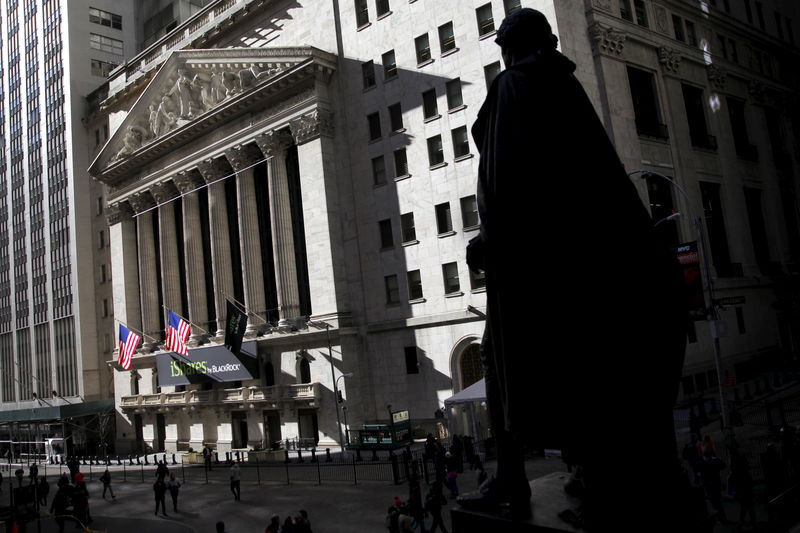Investing.com -- U.S. stock futures slipped marginally lower Monday, as investors digest the weekend’s tumultuous events in Russia at the start of a week which culminates with the release of key inflation data.
By 06:45 ET (10:45 GMT), the Dow Futures contract was down 10 points or 0.1%, S&P 500 Futures traded 5 points or 0.1% lower, and Nasdaq 100 Futures dropped 30 points or 0.2%.
The three main equity averages closed lower Friday, ending multi-week winning rallies, with the blue-chip Dow Jones Industrial Average dropping 1.7%, the broad-based S&P 500 losing 1%, and the tech-heavy Nasdaq Composite 1.4% lower.
PCE price index looms large
The weakness, which followed a significant rally over the last couple of months, came after Federal Reserve Chair Jerome Powell made it clear that, in his view, the U.S. central bank is likely to hike interest rates a couple of more times this year, depending on incoming economic data.
The week’s main economic release will be Friday’s May personal consumption expenditures price index, the Federal Reserve’s preferred inflation gauge.
In the 12 months through April, the PCE price index, as well as the core rate, were still running well above the Fed’s 2% target, and the May numbers will feed into investor expectations around the central bank's next rate decision in July.
Russian turmoil keeps markets on edge
Investors will also be keeping a wary eye on events in Russia, following an aborted mutiny by a group of seasoned mercenaries over the weekend.
The market reaction has been relatively muted so far, but investors will be looking to see to what extent Russian President Vladimir Putin’s grip on power has been loosened, potentially leading to wild swings as the year progresses.
Goldman downgrades Tesla
In corporate news, earnings this week largely center around results from Walgreens Boots Alliance (NASDAQ:WBA) on Tuesday and Nike (NYSE:NKE) on Thursday, but Tesla (NASDAQ:TSLA) is likely to be in focus Monday after Goldman Sachs downgraded its rating on the electric vehicle manufacturer to ‘neutral’ from ‘buy’.
The influential investment bank followed similar moves made by the likes of Morgan Stanley (NYSE:MS) and Barclays (LON:BARC) last week, citing a heightened valuation after a rally of over 100% since the start of the year, as well as a “difficult pricing environment for new vehicles.”
Oil just higher; growth worries remain
Crude prices handed back most of the early gains Monday as traders attempted to balance the safety of supply from Russia, one of the world’s largest producers, with faltering global growth.
By 06:45 ET, U.S. crude futures were 0.5% higher at $69.48 a barrel, while the Brent contract rose 0.5% to $74.39 per barrel.
Markets are pricing a moderately higher probability that domestic volatility in Russia leads to supply disruptions, but the early strength proved short-lived because worries over the strength of demand in the coming months remain.
Both benchmarks fell between 3% and 4% last week on worries that further interest rate hikes by the U.S. Federal Reserve, and other central banks, will hit economic activity at a time when China's economic recovery has also disappointed.
Additionally, gold futures rose 0.6% to $1,941.90/oz, while EUR/USD traded 0.1% higher at 1.0904.
(Oliver Gray contributed to this item.)
